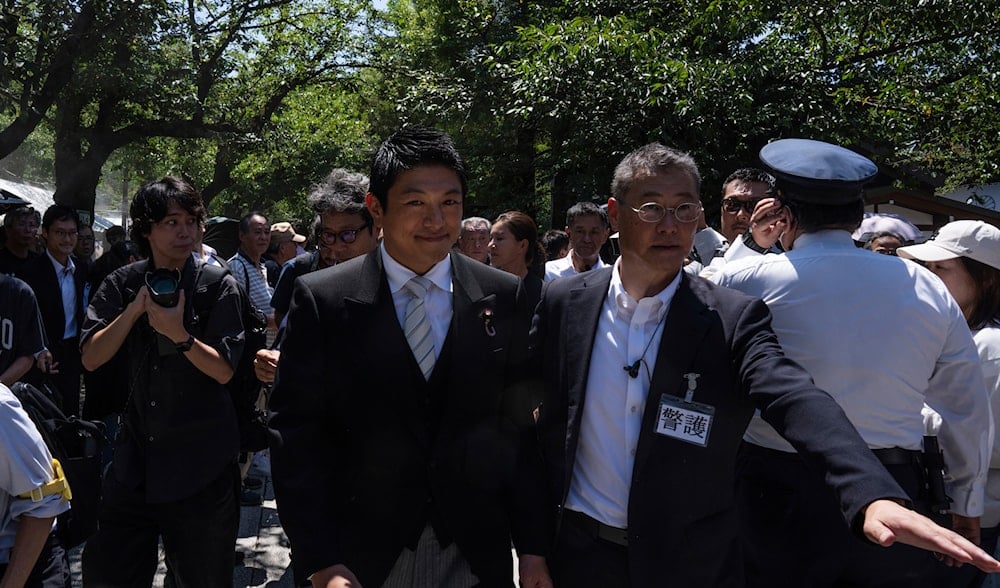Japan's far-right party seeks global conservative alliance
The party has actively courted prominent conservative figures in Trump's orbit.
-

Sohei Kamiya, leader of Japan's far-right populist Sanseito party, walks through the Yasukuni Shrine on the 80th anniversary of Japan's surrender in World War II, in Tokyo, Friday, Aug 15, 2025. (AP Photo/Louise Delmotte)
Japan's Sanseito party, a far-right political movement that emerged during the COVID-19 pandemic, is attempting an unusual strategy for Japanese politics: building international connections with Trump-aligned figures and European conservative movements to boost its domestic credibility.
Sanseito made a dramatic entrance into mainstream Japanese politics during July's upper house election, jumping from one seat to 15 in the 248-seat chamber.
The party's anti-immigration messaging about a "silent invasion" resonated with voters frustrated by rising living costs, despite Japan's foreign resident population being just 3% of the total, far lower than Western nations.
The election results contributed to the ruling Liberal Democratic Party (LDP) and its coalition partner losing their majority, ultimately leading to Prime Minister Shigeru Ishiba's resignation. A September poll by public broadcaster NHK showed Sanseito had become Japan's most popular opposition party.
Building bridges to the global right
To consolidate its gains, Sanseito established an international division in Tokyo this September, marking a significant shift for Japan's typically insular far-right politics. Party leader Sohei Kamiya explained the rationale to Reuters, "It's clear that we no longer live in an era where Japan can determine its course alone. So we want to get our message out abroad first."
The party has actively courted prominent conservative figures in Trump's orbit. According to US disclosure documents, Kamiya sought appearances on podcasts hosted by Steve Bannon, Trump's former strategist, and conservative commentator Tucker Carlson in 2024.
While scheduling conflicts prevented an interview after the July election, Bannon told Reuters he's "working to get him on," calling Sanseito "a revolutionary force in Japanese politics."
Speaking to Reuters, Carlson said he supported the party's immigration stance as crucial to protecting Japanese culture, saying he wanted to connect with Kamiya and would "have my guys call him right now."
The party also brought US influencer Charlie Kirk to Tokyo in September, where he spoke alongside Kamiya about avoiding mass migration. Kirk was fatally shot less than a week after the event. Sen Yamanaka, who heads Sanseito's international arm, represented the party at Kirk's memorial in Arizona.
Kamiya has also met with Germany's far-right AfD party leadership and plans to invite prominent right-wing figures from France, Germany, and Britain to conferences in Japan.
'MAGA with Japanese characteristics'
Sanseito's "Japanese First" slogan deliberately echoes Trump's "America First" mantra, though Kamiya told Reuters members of his party are "not Trump worshippers." He criticized the president's trade policies and said he would have rejected Japan's $550 billion investment program for tariff relief as "unfair."
Like Trump, Kamiya has generated controversy with his rhetoric, criticizing gender-equality policies, blaming foreigners for wage stagnation, and using a slur against Japan's ethnic Korean population, for which he later apologized.
The politeness problem
Sanseito faces a uniquely Japanese challenge, which is how to pursue disruptive politics in a society that values harmony and consensus. Kamiya acknowledged this to Reuters, saying the party needs a less confrontational approach than Trump's to "shift Japan's political direction" without pushing "wacky" or extreme policies.
"Japanese value harmony and place an importance on getting broad, gradual consensus, I do, too," Kamiya told Reuters.
The party aims to win 30-40 seats in the next lower-house election, which would give it enough members to submit bills and potentially enter power-sharing arrangements.
Jeffrey Hall, a Japanese politics specialist at Kanda University, noted to Reuters that the international strategy could provide staying power where other challengers have failed, helping Kamiya "stand out" through recognition from Western figures making similar arguments about immigration.

 4 Min Read
4 Min Read








